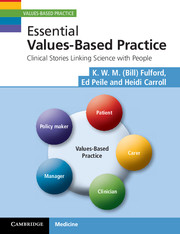Book contents
- Frontmatter
- Review quotes
- Contents
- Foreword
- Acknowledgements
- A bold claim to start this book
- Prologue: linking science with people
- Part 1 Values, individuals and an overview of values-based practice
- Part 2 The clinical skills for values-based practice
- Part 3 Relationships in values-based practice
- 8 “Best” in breast cancer: clinician values and person-centered care
- 9 Risks in safeguarding children: team values as well as skills
- Part 4 Science and values-based practice
- Part 5 Bringing it all together
- Postcript: the small change of care
- A bold claim to end this book
- Appendix A Values-based practice summary and definitions of key terms
- Appendix B Values-based practice teaching framework
- Index
9 - Risks in safeguarding children: team values as well as skills
Published online by Cambridge University Press: 05 June 2012
- Frontmatter
- Review quotes
- Contents
- Foreword
- Acknowledgements
- A bold claim to start this book
- Prologue: linking science with people
- Part 1 Values, individuals and an overview of values-based practice
- Part 2 The clinical skills for values-based practice
- Part 3 Relationships in values-based practice
- 8 “Best” in breast cancer: clinician values and person-centered care
- 9 Risks in safeguarding children: team values as well as skills
- Part 4 Science and values-based practice
- Part 5 Bringing it all together
- Postcript: the small change of care
- A bold claim to end this book
- Appendix A Values-based practice summary and definitions of key terms
- Appendix B Values-based practice teaching framework
- Index
Summary
Topics covered in this chapter
The importance of diverse team values (as well as knowledge and skills) in values-based practice is illustrated by the issues of risk and safety in a child protection case.
Other topics include:
Risk assessment and values
Strengths and limitations of protocols and procedural guidelines
Balanced clinical judgment
Diverse team values and person-values-centered care
The “extended” multidisciplinary team.
Take-away message for practice
Working in teams opens up a resource of diverse value perspectives that can support you in making balanced decisions in areas like risk assessment that require difficult judgment calls.
Like person-centered care in the last chapter, values-based practice brings an extra dimension to multidisciplinary teamwork. Teamwork is important in modern health care in part because no single profession, let alone individual, can hope to encompass all the diverse knowledge and skills required for effective evidence-based practice in the increasingly complex environment of modern health care. But the complexity of modern health care, as we saw in Part 1, is a complexity as much of the values-base of practice as of its evidence-base. Correspondingly, teamwork is important in values-based practice as much for the diverse values that different team members bring to the decision-making process as for their diverse knowledge and skills.
In this chapter, we illustrate the importance of the diverse value perspectives of team members through the story of how a GP, Dr. Lee Chew, manages the child protection issues raised when a young mother, Jade Spence, arrives in an “Extras” clinic on a Friday evening concerned that her four-month-old baby, Brit, has become sore “down below.”
- Type
- Chapter
- Information
- Essential Values-Based PracticeClinical Stories Linking Science with People, pp. 115 - 130Publisher: Cambridge University PressPrint publication year: 2012

